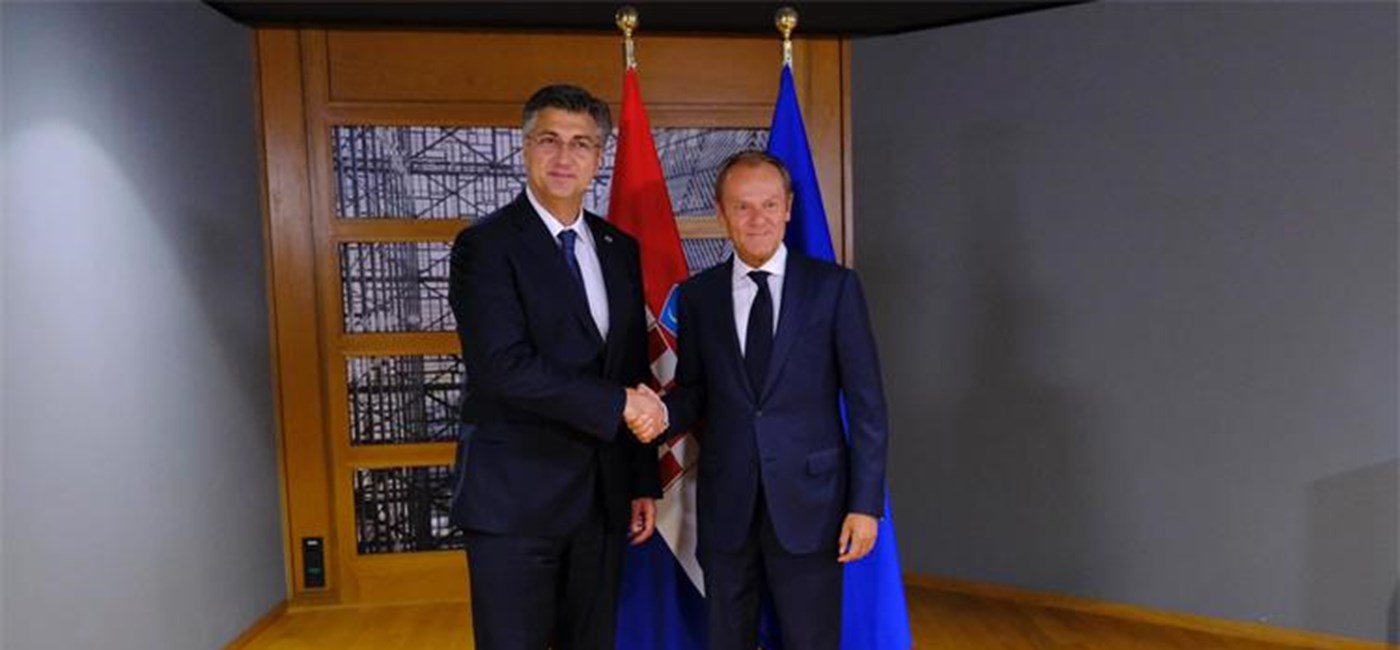"All the priorities were well accepted by all our interlocutors. The visit to the EU institutions was well timed," Plenkovic told reporters at the end of his three-day visit to Brussels, following a meeting with outgoing European Council President Donald Tusk.
The prime minister met with outgoing Commission President Jean-Claude Juncker and future Commission President Ursula von der Leyen, Commissioner for the Euro Valdis Dombrovskis, present and future Commissioner for the Budget Guenther Oettinger and Johannes Hahn, chief Brexit negotiator Michel Barnier, Finnish Prime Minister Antti Rinne, Japanese Prime Minister Shinzo Abe, current and future European Council President Donald Tusk and Charles Michel. He also addressed a forum on EU-Asia connectivity.
One of the topics discussed was Croatia's preparations to assume the six-month rotating EU presidency on January 1 next year. Croatia singled out four priority areas for its presidency: economic growth, the single market, cohesion and climate change; connectivity; internal and external security; and strengthening the Union's global role.
The meeting with Tusk also focused on preparations for a European Council meeting in Brussels on October 17-18, which will open discussion on the multiannual financial framework for the next seven years, and will also deal with Brexit. The Brexit situation is very uncertain because it is not yet clear whether the United Kingdom will leave the EU on October 31 as planned or if its departure will again be delayed, until the end of January next year.
Also discussed was the possibility of opening accession talks with Albania and North Macedonia. Ministers for European affairs are expected at their meeting in Luxembourg on October 15 to give the green light for the start of negotiations with the two countries. The German parliament gave the go-ahead a few days ago.
"Croatia's position is that both Albania and North Macedonia have met the criteria and that a decision should be adopted to that effect. Consultations are under way and we will see if all member states feel the same," the Croatian PM said.
As for Brexit, Plenkovic said the most important thing was for EU27 to remain united, adding that everyone was awaiting a concrete proposal from the British government. He said that Croatia was advocating an orderly departure of the UK, but was also ready for the opposite scenario.
Prime Minister Andrej Plenkovic said on Saturday it was politically important for Croatia to receive a positive European Commission assessment of its preparedness to join Schengen, adding that the assessment was expected soon, yet it was difficult to predict when Croatia would enter the passport-free travel area.
"Our goal is to receive in 2019 the European Commission's positive assessment that Croatia has met all the criteria. For us, it's politically important at this moment that this be the legacy of the Juncker Commission regarding Croatia's Schengen entry, after which the procedure moves to the Council of the EU," Plenkovic told Croatian reporters in Brussels at the end of a three-day visit.
The Commission is expected to give a positive assessment in mid-October.
Plenkovic said that right now he "can't give a reliable date as to when the entry decision will be made."
There are several reasons for that, the first being the fact that the EU has been trying for years to agree a reform of the Dublin system, which is a question of solidarity within the EU regarding migration, for which there is still no consensus. The second reason is that the Schengen system will have to be reinforced and the third that Bulgaria and Romania are still waiting to join.
Plenkovic said "we will stick to this topic and push for it at the Council of the EU based on our concrete achievements and decontextualise it from what might be a political angle by any country."
He said Croatia had done a lot to be prepared for Schengen, absorbing funds to strengthen external border controls and enhance the capabilities of the police who, he said, prevented illegal migration without putting up barbed wire or barriers like some of its neighbours.
Asked to elaborate on his statement that Slovenia, if it were to block Croatia's Schengen entry, could not do so indefinitely, Plenkovic said that Croatia had "quite extensive and big options."
"There's no need for further explanations. I'm not like some others who get agitated if I visit Brussels and then comment on it. I don't know that we ever commented on a visit by the Slovenian prime minister. I've said enough, they understood everything very well. We have ways to resolve bilateral issues, in a good neighbourly way, calmly and reasonably. Any resorting to blockades, to abusing a topic that has nothing to do with the substance isn't good and in the end always blows up in the face of the one doing it," Plenkovic said.
Text: Hina

.jpg?preset=news-carousel-img)


